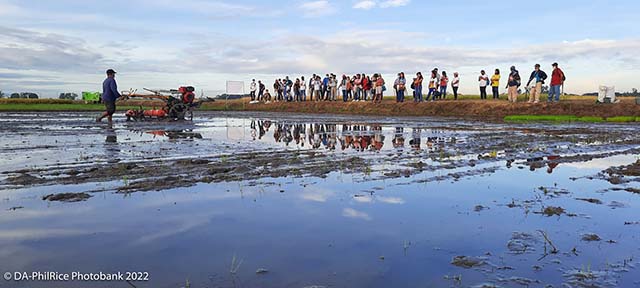
Practices and technologies that can help farmers save around P23,000 in rice production will be showcased in the Lakbay Palay hosted by the Department of Agriculture-Philippine Rice Research Institute (PhilRice), Sept. 14-15.
With the theme, “Bukid Tipid Tips, Subukan!” the two-day event will highlight the use of certified seeds of recommended varieties, mechanized farming, and rice-based technologies such as Palayamanan – an integrated farming system, vertical tower garden, and drip-irrigated aerobic rice.
According to PhilRice experts, farmers can save a lot by practicing alternate wetting and drying technology, using combine harvester, and right fertilizer application. These practices yield an estimated per hectare savings of P7,000, P3,250, and P2,600, respectively.
Savings from using certified seeds, proper land levelling, using drum seeder, and not applying pesticides also range from P380 to P4,000.
The paddy rice art at the FutureRice Farm, which displays the images of President Ferdinand R. Marcos Jr and Vice-President Sara Z. Duterte, will also be featured. The farm’s design followed the anamorphosis principle, a technique used in 3D art where a picture looks distorted but appears normal when viewed from a certain angle. The artwork was created using PSB Rc 10 and traditional purple rice.
Around 600 farmers from Pangasinan, Zambales, Oriental Mindoro, Nueva Ecija, Bataan, Pampanga, Bulacan, and La Union will attend the Lakbay Palay. The activity will also be mainstreamed in the DA-PhilRice fanpage.




